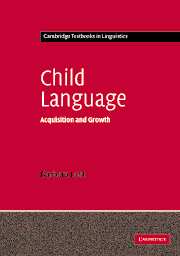Book contents
- Frontmatter
- Contents
- List of figures
- List of tables
- Preface
- Acknowledgements
- 1 The Growth of language
- 2 What is acquired?
- 3 What is the problem of language acquisition?
- 4 How we can construct a theory of language acquisition
- 5 Brain and language development
- 6 The nature of nurture
- 7 How can we tell what children know? Methods for the study of language acquisition
- 8 The acquisition of phonology
- 9 The acquisition of syntax
- 10 The acquisition of semantics
- 11 On the nature of language growth
- 12 Conclusions: toward an integrated theory of language acquisition
- Appendices
- 1 Developmental milestones in motor and language development (adapted from Lenneberg 1967)
- 2a Developmental milestones in infant speech perception
- 2b Examples of sound distinctions perceived by infants
- 3 Developmental milestones in infant speech production
- 4 Developmental milestones in infant syntax: perception
- 5 Developmental milestones in infant syntax: production
- 6 Developmental milestones in infant semantics
- 7 Abbreviations and notations
- Glossary
- References
- Author index
- Subject index
1 - The Growth of language
Published online by Cambridge University Press: 05 June 2012
- Frontmatter
- Contents
- List of figures
- List of tables
- Preface
- Acknowledgements
- 1 The Growth of language
- 2 What is acquired?
- 3 What is the problem of language acquisition?
- 4 How we can construct a theory of language acquisition
- 5 Brain and language development
- 6 The nature of nurture
- 7 How can we tell what children know? Methods for the study of language acquisition
- 8 The acquisition of phonology
- 9 The acquisition of syntax
- 10 The acquisition of semantics
- 11 On the nature of language growth
- 12 Conclusions: toward an integrated theory of language acquisition
- Appendices
- 1 Developmental milestones in motor and language development (adapted from Lenneberg 1967)
- 2a Developmental milestones in infant speech perception
- 2b Examples of sound distinctions perceived by infants
- 3 Developmental milestones in infant speech production
- 4 Developmental milestones in infant syntax: perception
- 5 Developmental milestones in infant syntax: production
- 6 Developmental milestones in infant semantics
- 7 Abbreviations and notations
- Glossary
- References
- Author index
- Subject index
Summary
Introduction
The acquisition of our first language is a silent feat. Most probably, we have no recollection of it at all. In many respects, the feat is essentially accomplished by the time children are three years old. Yet it is “doubtless the greatest intellectual feat any of us is ever required to perform” (Bloomfield 1933, 29; cf. Gleitman et al. 1988). The purpose of this book is to (a) introduce the scope and nature of this “intellectual feat,” and (b) highlight results from the last several decades from intensive scientific study of the mystery of its accomplishment. In doing so, we will (c) attempt to articulate essential theoretical issues which concern the “explanation” of this mystery. Throughout, we will (d) develop the foundation for a theory of first language acquisition. This theory is fundamentally “rationalist,” acknowledging the innateness of a powerful Language Faculty in the human species but integrating the role of constrained experience in the “growth of language” in order to explain language development. We will see that language acquisition is an inherently intellectual feat in that children do complex theory construction. The growth of language is mediated in the human species by complex symbolic computation.
Nothing is more specifically “human” than the knowledge of language. We have no firm means of scientifically determining how or when language originated in the human species. However, we witness this feat continually – in ourselves and in every child born.
- Type
- Chapter
- Information
- Child LanguageAcquisition and Growth, pp. 1 - 8Publisher: Cambridge University PressPrint publication year: 2006



